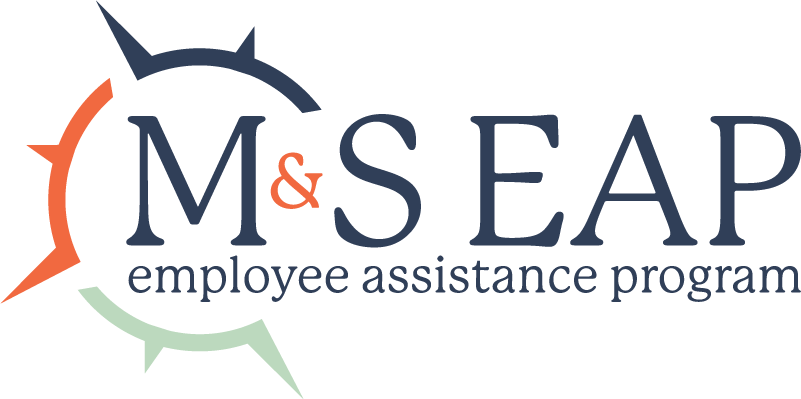How an EAP Promotes Wellness in the Workplace

We’ve all felt the pressure of work stress at some point. While some pressure at work can be beneficial, such as the intensity of a major project or the demands of a deadline that prompts us to work hard and do our jobs well, other work stress can have negative consequences.
Not only do we face work stress, but we’ve all encountered stress in our everyday lives, too. The hardship we face in our personal lives can spill over and affect our jobs, and our difficulties at work can overflow and interrupt our personal lives, too.
Navigating and managing the stress that comes with work is a tricky task that most people will have to learn at some point in their lives. In fact, the American Institute of Stress states that 83 percent of Americans suffer from work-related stress, with 25 percent of people identifying work as the largest stressor in their lives.
With work stress being so common, it’s important for employees and employers to take a good look at how their company handles this issue, and find solutions to make stress more productive, more enjoyable and more balanced. Here’s why.
Why employee wellness matters: for employees
From the perspective of employees, wellness may not seem like something that is connected to work. Many Americans try to compartmentalize, separating work life from home life. It’s easy to see why people prevent their jobs and home affairs from overlapping, but in reality, the thing we spend the most time on every day (our careers) are bound to have effects on the rest of our lives.
Employee wellness matters because stress can lead to extreme consequences if left unaddressed over time. Stress can cause depression, anxiety, sleep issues, disordered eating, relationship issues, substance abuse, financial issues, high blood pressure, heart disease and a weakened immune system, among other things. Stress can compound pre-existing mental and physical conditions, too.
Stress can make home life difficult, emotional issues frequent and time at work feel unbearable. For someone who is overwhelmed, the thought of dealing with stress can feel like just another thing to add to an overloaded plate.
Why employee wellness matters: for employers
Employers who understand how to promote wellness in the workplace will reap the benefits. Companies that use EAP services or other programs to foster stress management and employee well-being will experience greater employee satisfaction, improved employee productivity, lower turnover, reduced absenteeism and more.
Investing in your employees’ well-being does affect your bottom line as a business, and employees who experience a greater work-life balance are more likely to work hard for the job they care about. You’ll also enjoy decreased interpersonal conflict and a positive work atmosphere. Regardless of the type of business you’re in, employee wellness truly does matter.
How to promote employee wellness with an EAP
Ideally, your company already has some of these measures in place to enhance employee wellness. Aim to build all of these supports and find ways to improve the measures that already exist in your place of work.
What is an EAP?
An employee assistance program, or EAP, and wellness go hand in hand. EAPs are programs that a company uses to offer free, confidential support for work stress and other personal concerns. Rather than turning to your human resources department to discuss and access help for private matters, an EAP is designed to offer aid for employee and their families for issues such as substance abuse, financial planning and mental health counseling.
How does an EAP help with personal issues?
EAPs are designed to provide confidential help with some of life’s most private matters. Regardless of what your employees are struggling with, and EAP can make a difference. Here are a few common issues that can be addressed with the help of an employee assistance program.
- Marriage difficulties
- Mental health concerns
- Divorce
- Grief
- Financial issues
- Major life changes
- Caregiving
- Transitions like moving or job changes
- Substance use issues
Employees sometimes struggle to handle personal matters that are affecting their well-being, but offering an easy avenue to address these important issues is one of the best things a company can do for its employees.
How can an EAP help with crisis management?
An EAP can always benefit your employees, but sometimes the services are highly needed. These tend to be unique situations that affect an entire workplace, such as the following.
- The death of a coworker
- A natural disaster
- A local tragedy, such as a shooting
- A tragic accident at work
These situations are all very sensitive, and often HR personnel needs to find healing through an EAP, too.
How does an EAP help with work stress?
An EAP can help your employees to manage both work-related stress, and stress from personal matters that affect work. An EAP can help with the following areas that may be contributing to stress.
- Time management
- Communication
- Prioritizing
- Coping strategies
- Self-care
- Mindfulness
- Negative thinking patterns (sometimes called cognitive distortions)
A mental health professional can work with employees to manage all of life’s stressors in an effective way.
EAP and wellness of employees
Through an EAP, help and guidance from professional and licensed counselors can minimize the negative impacts of these common life situations. An EAP provides personalized consultations and follow-up services to promote personal and professional wellness through employee training and support addressing issues that impact the entire workplace. All EAP services are strictly confidential.
If your workplace could benefit from the services an EAP offers, check out Mazzitti & Sullivan EAP. Your success is our passion. Contact us today.



